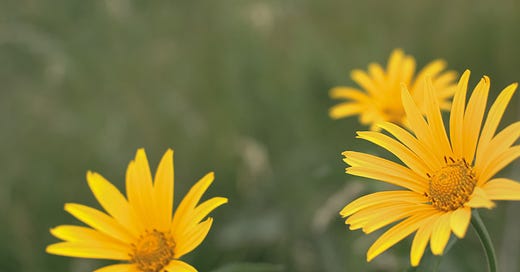Dear relatives,
How are you? Are you breathing, eating, resting, dreaming well?
On most mornings, my son and I start the day with a poem that goes something like this:
Good morning Grandfather Sun / Good morning Grandmother Moon / Good morning Mother Earth / Good morning Father Sky / Good morning All my Relations.
Each line is an offering of gratitude to the Sun, Moon, Earth, Sky, and Creation celebrating human and more than human life. It has become a ritual. We also try to repeat the poem in the evening before bedtime, along with the question: What was your favorite part about today?
Often I am delighted with the answers I hear, especially when the response is a feeling, something that expresses a connection with the land, or a moment of awe. This is one of many prayer poems that we share together, a cross-pollination of oral tradition and spoken word; a reclamation of the nursery rhyme, with a bend towards reciprocity. The words that populate the poems are meant to give direction. Similar to the practice of writing, they can also be navigational signs pointing out the constellation of relationships that make us who we are.
I read an essay a few weeks ago by a fellow Substack writer, Ayana Zaire Cotton, on “Writing With the World,” in which they ask, Why does it feel like we're all writing more? In revisiting the essay for this letter, I spent some time with the central inquiry, realizing it is something I’ve also been interested in exploring on a personal and collective level. With an array of newsletter platforms to choose from, I find it fascinating to think about the assortment of ideas floating around the world wide web. In their essay, Cotton talks about the process of becoming a writer, noting, “I now know my writing practice was never mine, it too belonged to the world because it too was made up of the world. The river of data we swim in everyday.”
It is curious that there is a sort-of communal arrival at the shore of writing. Cotton speculates that grief might be the reason. The stress of the last half-decade, with the breath being of chief concern, both politically and ecologically, is certainly reason enough to write it all down. Writing, especially by hand, can help us sort through the chasm of thoughts swirling in the mind, and it is also a helpful tool to help regulate the breath.
Similar to Cotton, I think the practice of writing is a way of being in and with the world. Writing is an embodied experience because it involves and concerns the body. We write with and through the body, using the hands, head, and heart. As I learn more about nature writing, a genre where I feel most at home as a writer, I am witnessing the prevalence of nature as a theme throughout diverse literary forms. In the 2013 Nature article, “New words on the wild,” writer Robert Macfarlane addresses the renaissance of nature writing occurring in the global North (namely North America and Britain), noting a blend of narrative with other branches of writing including science, memoir, eco-criticism, and folklore. Interestingly, Macfarlane discusses why a resurgence of nature writing has emerged in his homeplace of Britain, citing two potential causes: disembodiment and global crisis. The simultaneous sense of disembodied beings fused with impending collapse is fundamentally rooted in the same source of detachment. “It is no coincidence that a literature celebrating the natural world should have emerged at a time when the natural world is so conspicuously under threat,” Macfarlane writes.
Ten years since the essay was written, and not much has changed. Conditions are, in fact, becoming worse. Literature can help point out the detriments that lay before us, but it is not our savior. Yet, I do think that writing is something we can offer as a gift in earnest. I wonder, too, what healing might be possible when we name the complexity of the current era—referred to as the Anthropocene—giving voice to the vast expanse of our relationships. Robin Wall Kimmerer calls this “Learning the Grammar of Animacy,” the title of an essay in her seminal work, Braiding Sweetgrass: Indigenous Wisdom, Scientific Knowledge, and the Teachings of Plants, a book that I often return to. Many of us do not know the languages that our ancestors spoke, this is true for me. And then there are those words used to talk about nature that have been nearly forgotten, as Macfarlane speaks to in The Lost Words, a spell-book that calls for conjuring back the magic and intimacy of the Earth. I hope that through a concerted reframing of the way language is used, we can transform our relationship with place, beginning with using the most loving and respectful words available to address the diversity of life that is teeming around us.
With gratitude
Christian
Practice Opportunity
The Seasonal Embodiment Workshop is coming up in September! Paid subscribers have access to both sessions, in September and December. If you are a free subscriber there are sliding scale options available. I will send out a gentle reminder with the connection details on the last Sunday in August, and again about a week out from the date of the gathering. Many thanks to those who have registered!
Listening | Reading | Creating
Rest in Power, Sixto Rodriquez.
The week’s share centers on an exercise from Sophie Strand, another fellow writer on Substack. It comes from the interview “On Myths as Maps,” with For The Wild, where she asks listeners to imagine that all of the words we knew were erased, and we could only call back 50, what would they be? For the next 10 days, I am on holiday with my family, and this is the question I want to sit with.
How about you, relative? If you only had 50 words, what, or who, would you choose?





